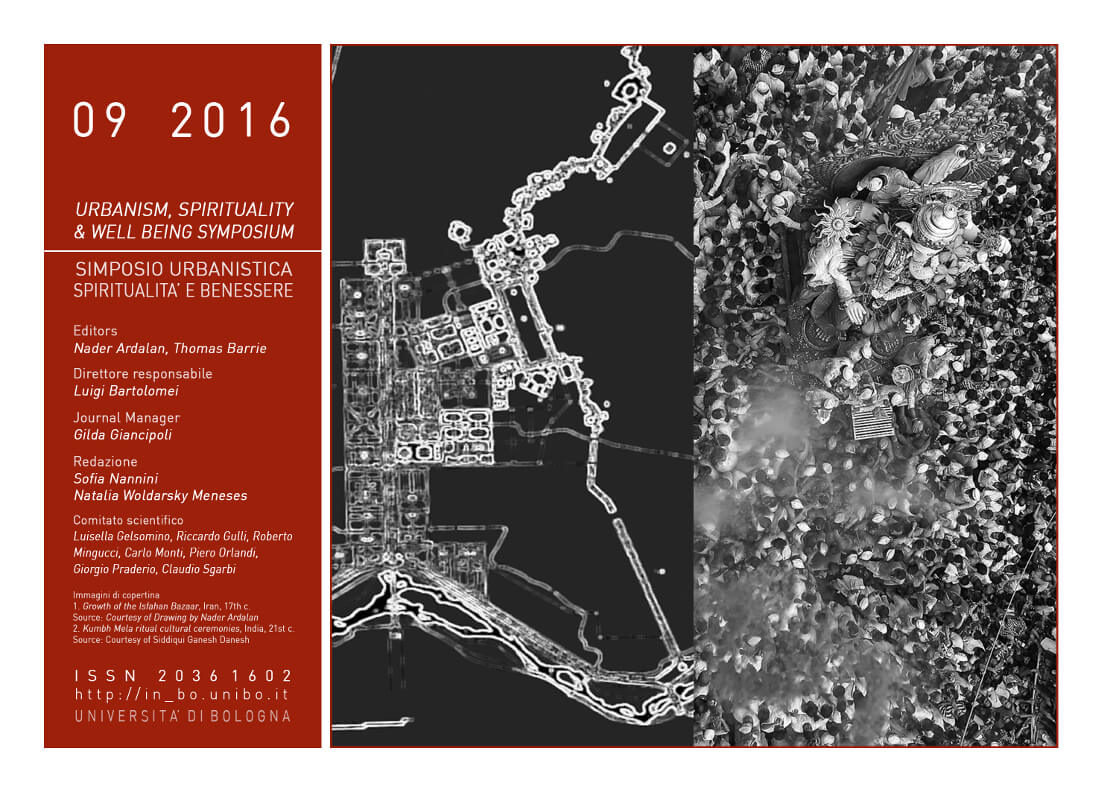Pensiero utopico e l’interculturale co-creazione di futuri urbani
DOI:
https://doi.org/10.6092/issn.2036-1602/6292Parole chiave:
Pianificazione urbana, Utopia, Inclusione sociale, Pluralismo, Multiculturale, Comunità ecologicaAbstract
Così come le città affrontano le pressioni ambientali e sociali riferite al cambiamento del clima, così richiedono una rapida trasformazione. I sistemi ambientali e sociali globali sono tesi sotto la pressione degli stili di vita di una borghesia estremamente consumista, particolarmente in Nord-America. La continua crescita ed il consumo peggiorano la questione. Il pensiero utopistico ci permette di concentrarci sulla speranza, piuttosto che sul conflitto e sulla disperazione. Esso permette di considerare i cambiamenti fisici in forma localizzata ecologicamente che integra i sistemi urbani e di considerare i cambiamenti sociali nella forma di un’utopia eco-sociale partecipativa. Utilizzando un approccio funzionale siamo in grado di trasformare le sfide della differenza e della diversità in opportunità per enfatizzare l’inclusione, e il pluralismo culturale e religioso, nella co-creazione di visioni reciprocamente vantaggiose del futuro urbano.Riferimenti bibliografici
Newman, Peter, Timothy Beatley, and Heather Boyer. (2009). Resilient Cities: Responding to Peak Oil and Climate Change B. Washington, D.C.: Island Press.
Beatley, Timothy. (2010). Biophilic Cities: Integrating Nature into Urban Design and Planning. Island Press.
Kraftl, Peter. (2007). Utopia , performativity , and the unhomely. Environment and Planning D: Society and Space 25: 120–143.
Kapoor, Rakesh. (2007). Auroville: A spiritual-social experiment in human unity and evolution. Futures 39: 632–643.
Critchley, Simon. (2011). Is Utopianism Dead. The Harvard Advocate.
Klein, Naomi. (2014). This Changes Everything: Capitalism versus the Climate. New York: Simon & Schuster.
Guldi, Jo, and David Armitage. (2014). The History Manifesto. Cambridge, UK: Cambridge University Press
Kraftl, Peter. (2007). Utopia , performativity , and the unhomely. Environment and Planning D: Society and Space 25: 120–143.
Rees, William E. (2008). Human nature, eco-footprints and environmental injustice. Local Environment 13. Routledge: 685–701
Maltz, Alesia. (2015). “Plant a victory garden: our food is fighting:” Lessons of food resilience from World War. Journal of Environmental Studies and Science 5: 392–403.
Viljoen, Andre, and Katrin Bohn. (2009). Continuous Productive Urban Landscape (CPUL): Essential Infrastructure and Edible Ornament. open house international 34: 50–60
WWF. (2014). Living Planet Report 2014. Gland, Sweitzerland.
Hulme, David. (2015). Global Poverty: Global Governance and Poor People in the Post-2015 Era. New York: Routledge.
Albert, Michael. (2006). Realizing Hope: Life Beyond Capitalism. London: Zed Books.
Hulme, David. (2015). Global Poverty: Global Governance and Poor People in the Post 2015 era. Second. Abingdon, Oxon: Routledge.
James, William. (1995). The Moral Equivalent of War 1: 17–26.
Friedmann, John. (2000). The Good City: In Defense of Utopian Thinking. International Journal of Urban and Regional Research 24. Page 469
Tikiz, Gulsah, and Feryal Çubukçu. (2014). Picturing direct and indirect behaviour modification in Walden Two : the flawed utopia. Procedia - Social and Behavioral Sciences 158: 107–114.
Aguilar, Jade. (2015). Food Choices and Voluntary Simplicity in Intentional Communities : What ’ s Race and Class Got to Do with It? Utopian Studies 26: 79–100.
Roggema, Rob. (2014). The Design Charrette. Dortrecht: Springer.
Tonkiss, Fran. (2013). Cities By Design. Cambridge, UK: Polity Press.
Opdam, Paul, Joan Iverson, Nassauer Zhifang, Christian Albert, Gary Bentrup, and Simon Swaffield. (2013). Science for action at the local landscape scale: 1439–1445
Moser, Susanne C. (2010). Communicating climate change: history, challenges, process and future directions. WIREs Climate Change 1: 31–53.
Senbel, M., and S. P. Church. (2011). Design Empowerment: The Limits of Accessible Visualization Media in Neighborhood Densification. Journal of Planning Education and Research 31: 423–437.
Senbel, M. (2012). Experiential Learning and the Co-creation of Design Artifacts: A Hybrid Urban Design Studio for Planners. Journal of Planning Education and Research 32: 449–464
Sen, Amartya. (1999). Commodities and Capabilities. Oxford: Oxford University Press.
Nussbaum, Martha. (2003). Capabilities as fundamental entitlements: Sen and social justice. Feminist Economics 9: 33–59.
Nussbaum, Martha C. (1999). Sex and Social Justice. New York: Oxford University Press. Page 57
Basta, Claudia. (2016). From justice in planning toward planning for justice : A capability approach. Planning Theory. 15: 190-212.
Marcuse, Peter. (2009). From Critical Urban Theory to the Right to the City. City 13.
Blakeley, Ruth. (2015). Human rights, state wrongs, and social change: the theory and practice of emancipation. Review of International Studies 3: 599–619.
Holden, Meg, and Andy Scerri. (2015). Justification , compromise and test : Developing a pragmatic sociology of critique to understand the outcomes of urban redevelopment. Planning Theory 14: 360–383.
Gleeson, Brendan. (2012). Critical Commentary. The Urban Age:
Paradox and Prospect. Urban Studies 49: 931–943.
Saunders, Doug. (2011). Arrival City: The final migration and our next world. Toronto: Random House.
Clutterbuck, Peter, and Krista Lords. (2010). Towards an Integrated Immigrant Services Delivery System in Durham Region. Ajax. Community Development Council Durham
Basta, Claudia. (2016). From justice in planning toward planning for justice : A capability approach. Planning Theory. 15: 190-212.
Robeyns, Ingrid. (2006). The Capability Approach in Practice. The Journal of Political Philosophy 14: 351–376.
Hall, Kia M Q. (2014). Developing a Dual -Level Capabilities Approach : Using Constructivist Grounded Theory and Feminist. Journal of Ethnographic and Qualitative Research 8: 128–143.
Downloads
Pubblicato
Come citare
Fascicolo
Sezione
Licenza
Copyright (c) 2016 Maged Senbel
I diritti d'autore e di pubblicazione di tutti i testi pubblicati dalla rivista appartengono ai rispettivi autori senza alcuna restrizione.
Questa rivista è distribuita con licenza Creative Commons Attribuzione - Non commerciale 4.0 Internazionale (licenza completa).
Vedere anche la nostra Open Access Policy.
Metadati
Tutti i metadati dei materiali pubblicati sono rilasciati in pubblico dominio e possono essere utilizzati da ognuno per qualsiasi scopo. Questi includono i riferimenti bibliografici.
I metadati – riferimenti bibliografici inclusi – possono essere riutilizzati in qualsiasi formato senza ulteriori autorizzazioni, incluso per scopo di lucro. Chiediamo cortesemente agli utenti di includere un collegamento ai metadati originali.






